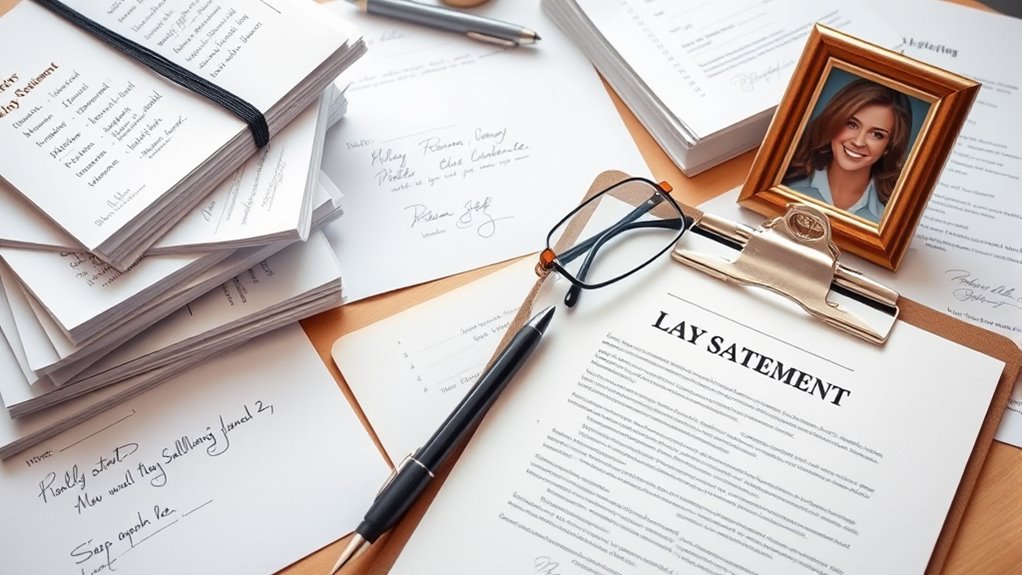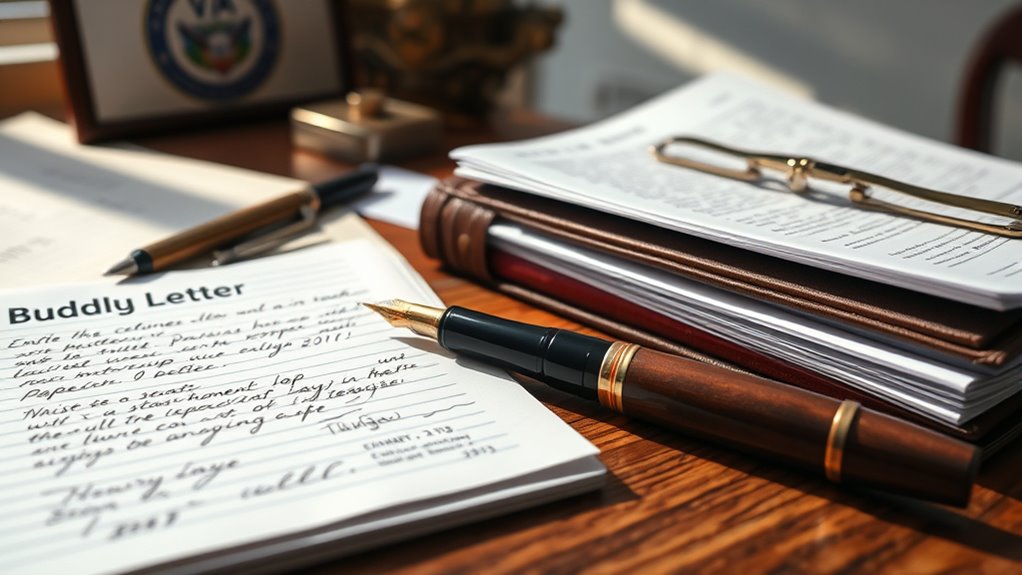Lay statements and buddy letters are key to supporting your hearing loss claim by providing personal, detailed accounts of how your condition impacts daily life. These statements should focus on specific examples, like missing conversations or instructions, and come from people who observed your struggles firsthand. Including clear, factual details strengthens your case and helps the VA see beyond medical reports. Keep going to learn how to craft these statements effectively and boost your chances for approval.
Key Takeaways
- Buddy letters provide firsthand observations of hearing difficulties, supporting medical evidence in VA claims.
- Effective statements detail specific incidents, dates, and the claimant’s daily challenges due to hearing loss.
- Including credible witnesses like family or colleagues strengthens the claim by demonstrating consistent symptoms.
- Statements should focus on factual, objective descriptions rather than opinions to enhance credibility.
- Well-prepared buddy letters can fill gaps in medical evidence and improve the chances of claim approval.

When filing a VA hearing claim, supporting your case with lay statements and buddy letters can make a significant difference. These personal accounts help establish the severity and impact of your condition, especially when medical evidence alone might not fully capture your experience. While medical evidence is essential, it often doesn’t tell the complete story from your perspective. That’s where lay statements and buddy letters come in—they provide firsthand insights into your day-to-day struggles, how your hearing loss affects your life, and how the condition has progressed over time.
Supporting your claim with these statements requires understanding the legal requirements. The VA looks for credible, detailed accounts that clearly relate to your claimed disability and connect it to your military service. Your witnesses should include friends, family members, or colleagues who have observed your hearing issues firsthand. Their letters should describe specific instances where your hearing loss caused difficulties, such as missing important conversations, struggling to hear orders or instructions, or feeling isolated because of your condition. The more detailed and specific these statements are, the stronger they are in supporting your case.
It’s essential that these statements are honest and focus on factual observations rather than opinions. The VA prefers statements that describe what the witness personally saw or heard, rather than generalized or speculative comments. For example, instead of saying, “He seems to have a hearing problem,” a better statement would be, “I observed him consistently asking people to repeat themselves because he struggled to hear them clearly, especially in noisy environments.” This kind of detail makes the statement more credible and helps meet the VA’s legal requirements for supporting evidence.
Remember, the goal of these statements is to fill in gaps that medical evidence might leave. While doctors can provide reports about your hearing loss, they might not fully capture how it affects your daily life. Your buddy letters should complement this medical evidence by illustrating real-world challenges you face. Be sure to include the date, your relationship to the witness, and their contact information. These details help validate the statement and establish its credibility.
Additionally, understanding the types of evidence that support hearing claims can improve your chances of success. Ultimately, well-crafted lay statements and buddy letters can strengthen your VA hearing claim by providing compelling, firsthand evidence. They help the VA understand the true impact of your disability beyond clinical data, fulfilling the legal requirements for supporting your case. When submitted properly, they can make your claim more convincing and increase your chances of securing the benefits you deserve.
Frequently Asked Questions
Can Lay Statements Be Used as Sole Evidence for Hearing Claims?
Yes, lay statements can be used as the sole evidence for hearing claims, but they are often more effective when supported by medical evidence or expert testimony. Your personal account provides insight into how your condition affects you, but medical records and expert opinions strengthen your case. Relying solely on lay statements may limit your chances, so it’s best to include as much supporting evidence as possible.
How Should Witnesses Address Their Relationship to the Claimant?
When witnesses write their statements, they should clearly state their relationship to the claimant to establish relationship clarity. This transparency enhances witness credibility, helping the VA assess the accuracy of their account. Be specific about how you know the claimant and your interactions. Avoid vague language, and focus on factual, personal observations. Clear relationship details strengthen your statement, making it more impactful and trustworthy in supporting the claimant’s case.
What Legal Requirements Must Buddy Letters Meet?
Did you know that 70% of VA claims are approved with strong supporting evidence? Buddy letters must meet legal standards by providing specific, firsthand observations that relate directly to the claimant’s condition. These letters should include detailed medical documentation, clearly identify the relationship to the claimant, and be signed and dated. Ensuring these legal standards are met helps strengthen your case and improves the chances of a successful hearing outcome.
Are There Specific Formats for Submitting Lay Statements?
You can submit lay statements in any clear, written format, but following lay statement tips helps guarantee your message is effective. Use your own words, describe your personal knowledge, and include specific details about how your condition affects you. Follow buddy letter guidelines by ensuring the letter is signed, dated, and includes contact information. Clear, honest, and detailed statements strengthen your claim and help the decision-makers understand your situation better.
How Can I Ensure My Statement Is Credible and Impactful?
To guarantee your statement is credible and impactful, follow credibility tips like being honest, specific, and detailed. Clearly describe your experiences, including dates, symptoms, and how your condition affects daily life. Use your own words and avoid exaggeration. Organize your statement logically to improve its impact. Including supporting details helps the decision-maker understand your situation, making your statement more persuasive and credible.
Conclusion
In the journey of your hearing claim, lay statements and buddy letters are like guiding stars, illuminating your path through the legal night. They add warmth and clarity, turning your story into a vivid tapestry that judges can’t ignore. Think of them as heartfelt whispers from those who’ve seen your struggles firsthand, painting a picture that words alone can’t capture. Together, they help your case shine brighter, guiding you toward the justice you deserve.











